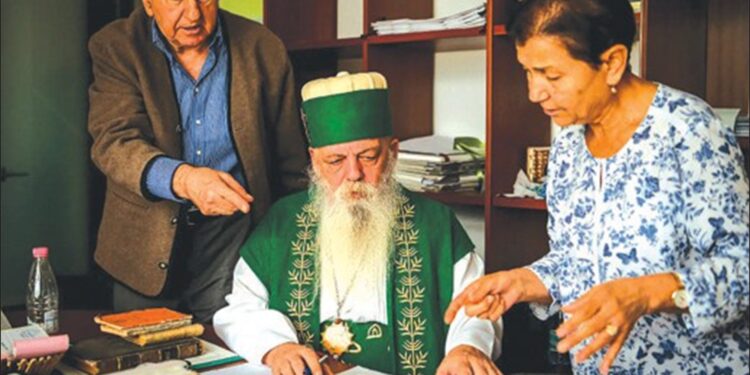October 25, 2024

Albania is planning to create a tiny Vatican-like Muslim state inside its capital city that will promote a tolerant type of Shiism to all the world. It will be run by the Bektashi, a Shiite Sufi order founded in the 13th Century that is believed to be the largest faith in Albania. Its supreme leader will be His Holiness Haji Dede Baba, 65, who makes clear that women will not have to cover their hair in his tiny state.
Alcohol will not be banned. In fact, there will be very few rules as he believes that people should decide things for themselves, and he has nothing but disdain for rigid dogma. As he describes it, his Muslim Vatican state will effectively propound a view of the world directly contrary to that of the Islamic Republic of Iran.
His Holiness says one goal of the new state will be to show Islam to the world as a peaceful and tolerant religion eager to work with other faiths. Albanian Prime Minister Edi Rama (a non-practicing Roman Catholic) supports the idea and will soon present it to Parliament. If adopted, the Sovereign State of the Bektashi Order will be created on 27 acres (11 hectares) of land in Tirana, the capital of Albania, just as Vatican City has been a sovereign country on 109 acres (44 hectares) of land within Rome for almost a century.
Bektashi would then become the world’s smallest country, replacing Vatican City. A team of legal experts, including international lawyers, is drafting legislation defining the new state’s sovereign status inside Albania. That will need to be endorsed by Parliament, controlled by Rama’s governing Socialist Party. It is unclear what countries will recognize Bektashi sovereignty but Iran is not likely to be one of them. “The Iranians are frankly my last thought,” Rama told The New York Times, noting that Albania broke off diplomatic relations with Iran in 2022 after linking it to a cyberattack on Albanian government and banking networks. Baba Mondi, as His Holiness is universally known in Albania, has long campaigned against extremism.
After Islamist militants killed 12 people in a 2015 attack on the French satirical weekly Charlie Hebdo, the Bektashi leader traveled to Paris along with Rama to join a march against terrorism. He said the new Bektashi state might need a small intelligence service “because we have enemies too” but won’t have an army, border guards or courts. Details such as who will be eligible for passports still have to be worked out, he added, but the passport color has been decided: green.
Committed to soothing rather than stoking tensions, the new state has already sworn off the curse of many nations that of territorial ambition. Baba Mondi vowed not to make any attempt to expand his territory by grabbing back land his order once held in the Albanian capital.
The Tirana compound, which originally covered nearly 90 acres, has shrunk by twothirds since Albania’s former communist dictator, Enver Hoxha, outlawed all religion in 1967 and his government began building warehouses on Bektashi territory in the capital. After the collapse of communism in 1991, the Bektashis lost yet more land when private developers built homes on the edge of the compound without permission.
Rama said the borders of the proposed Bektashi state would be defined by what the sect has: “What was seized is not part of that,” he said. Squabbles over property ownership, he said, would only undermine the state’s purpose as a “model of coexistence.” Baba Mondi, for his part, declared the statehood plan “a miracle” and expressed hope that the United States and other Western powers would recognize his state’s sovereignty if Parliament endorses the prime minister’s plan.
“We deserve a state,” he said, “We are the only ones in the world who tell the truth about Islam” and “don’t mix it up with politics.” How many Bektashi believers there are in the world is unclear, and even their number in Albania is subject to wildly different estimates, ranging from just a few percent of the country’s population of less than three million to many times that.
Baba Mondi said around half the total population was Bektashi, the rest being Sunnis, Catholics, Orthodox Christians, and evangelical Christians. That is almost certainly an exaggeration, but it reflects a widespread view of the sect as Albania’s national religion. Viewed as heretics by many conservative Shiites and Sunnis, and subjected to centuries of persecution in Muslim lands, the Bektashis have been an influence in Albania and neighboring countries such as Kosovo and North Macedonia since the Ottoman Empire’s conquest of the Balkans in the 14th and 15th centuries.
Members of the sect played a prominent role in Albania’s nationalist awakening against Turkish rule, promoting a relaxed version of Islam that helped rally the country’s large Muslim and Christian communities behind the secular cause of independence.
